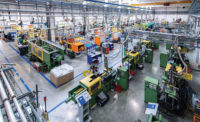The MFGWatch survey asked buyers to describe their business's response to the rising cost of fuel. 30% stated they would raise prices to their customers, 29% would make savings or productivity gains in other areas and 14% would absorb the cost and accept lower profitability. 21% responded there would be no changes, while the remaining buyers would react by asking suppliers to charge less.
When asked what changes were planned to lower or offset fuel costs for their businesses, buyers replied:
In addition to transportation costs rising as a result of fuel price increases, buyers were asked to identify associated factors impacting their businesses:
Going Green
When asked if their company was actively pursuing green manufacturing practices, 51% of the participants responded affirmatively, 36% stated no changes were being made, and 12% did not know if their companies were pursuing green initiatives. The affirmative respondents were asked to describe the green initiatives they were currently practicing:
Buyers employing green-manufacturing practices also were asked how it affected their bottom line:
The survey also inquired if buyers were developing new products to reduce their own fuel-related costs, such as reducing the size and weight of components and intermediate packaging. Sixty six percent of the participant responded negatively, while 28% stated they were developing new products. Six percent did not know if their companies were taking steps to develop new products.
Buyers were asked if they were developing new offerings that would enable their customers to reduce the fuel costs associated with using their products and services. Thirty one percent of respondents stated they were developing new offerings, while 60% stated they were taking no steps in this direction.
More than 450 North American respondents from the MFG.com buyer community completed the survey, with 88.2% of the participants from the United States and 11.8% from Canada. Participants included engineers, purchasing professionals and operations managers.


